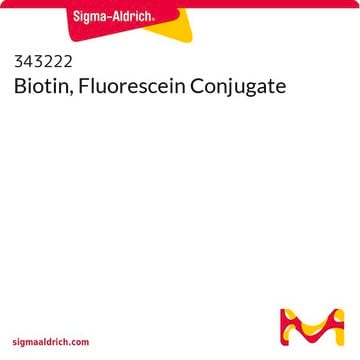28616
Atto 425-Biotin
BioReagent, suitable for fluorescence, ≥95.0% (HPCE)
Synonym(s):
Biotin-Atto 425
About This Item
Recommended Products
product line
BioReagent
Assay
≥95.0% (HPCE)
form
powder
manufacturer/tradename
ATTO-TEC GmbH
fluorescence
λex 437 nm; λem 483 nm in 0.1 M phosphate pH 7.0
suitability
suitable for fluorescence
storage temp.
−20°C
SMILES string
CCOC(=O)C1=Cc2cc3C(C)CC(C)(C)N(CCCC(=O)NCCCCCNC(=O)CCCCC4SCC5NC(=O)NC45)c3cc2OC1=O
InChI
1S/C37H53N5O7S/c1-5-48-34(45)26-19-24-18-25-23(2)21-37(3,4)42(28(25)20-29(24)49-35(26)46)17-11-14-32(44)39-16-10-6-9-15-38-31(43)13-8-7-12-30-33-27(22-50-30)40-36(47)41-33/h18-20,23,27,30,33H,5-17,21-22H2,1-4H3,(H,38,43)(H,39,44)(H2,40,41,47)
InChI key
LPVYZZMUDCZDQO-UHFFFAOYSA-N
General description
Application
Legal Information
Storage Class Code
11 - Combustible Solids
WGK
WGK 3
Flash Point(F)
Not applicable
Flash Point(C)
Not applicable
Personal Protective Equipment
Certificates of Analysis (COA)
Search for Certificates of Analysis (COA) by entering the products Lot/Batch Number. Lot and Batch Numbers can be found on a product’s label following the words ‘Lot’ or ‘Batch’.
Already Own This Product?
Find documentation for the products that you have recently purchased in the Document Library.
Articles
Atto dyes are a series of fluorescent dyes that meet the critical needs of modern fluorescent technologies.
Our team of scientists has experience in all areas of research including Life Science, Material Science, Chemical Synthesis, Chromatography, Analytical and many others.
Contact Technical Service





